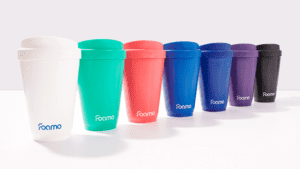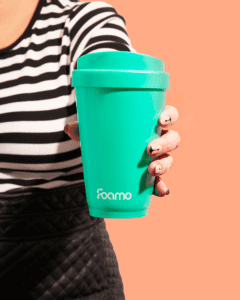
Sumitomo (SHI) Demag Powers FOAMO’s Sustainable Coffee Cup Innovation
Drinkware manufacturer First Editions has launched a revolutionary new lightweight reusable coffee cup concept. Made from renewable plant-based polypropylene, the company’s choice in energy-saving all-electric injection moulding machinery from Sumitomo (SHI) Demag. Along with the enthusiastic assistance of processing and zero carbon power experts, fully supports the FOAMO planet-friendly cups sustainability mission.
Every aspect of R&D to full-scale production and commercialisation of the FOAMO cups and lids manufacturing process was meticulously defined by the Birmingham-based family business. Designed, engineered and manufactured entirely in the UK on two dedicated Sumitomo (SHI) Demag IntElect2 machines. Located at the Birmingham Tyseley Energy Park, the moulding cells are powered solely by electricity generated from an on-site biomass plant.
Made using 85% less virgin polymer material than comparable reusable hot drink cups, the unique robust foamed wall reduces plastic use by 50%. This foamed wall also holds heat better, so hot drinks stay warm without requiring an extra card sleeve. The cup itself is 50% lighter compared to traditional plastic coffee cups. This results in a carbon footprint across the entire production journey that is 20 times smaller.

“Given that 2.5 billion disposable coffee cups end up in landfill each year in the UK alone, tackling waste and plastic pollution requires urgent and immediate action. Equally, many recyclable cups are not as green as they are perceived,” reports the mastermind behind the FOAMO concept, Managing Director Mark Alderson.
For example, bamboo cups often contain high amounts of non-recyclable melamine. Conversely, the FOAMO cups are made from a renewable feedstock food-grade polypropylene created from 70% waste, such as cooking oil. They are also fully kerbside recyclable, including the IML.
Supporting sustainability from start to end
Eager to reshore production and bring injection moulding in-house, Mark visited K Show 2019 to research potential technology suppliers. Sumitomo (SHI) Demag’s clear brand messaging resonated with Mark’s sustainability motivations.
“The Sumitomo (SHI) Demag team has been extremely patient and supportive as we moved from experimenting with concepts to full trials. Giving us the confidence that we would meet our goal to launch FOAMO at Merchandise World 2025. They were also very open-minded about supporting our decarbonisation production efforts,” adds Mark.
Being the first ever foam-filled cup with a screw thread in the lid, moulding precision and processing control is essential. Mark comments: “Responsible manufacturing means minimising production waste. It has involved hundreds of cup leak tests. But the efforts have been valuable as we have achieved a stable process and the repeatability that reduces rejects.”
Expanding on the benefits of the IntElect series, Ashlee Gough explains: “This process is unique and demands incredibly high levels of reactivity and repeatability. In this case, direct drive was the only way to achieve the level of performance required. The responsiveness of the direct drive toggle platform on the IntElect ensured we met the strict requirements for average opening speed, while the accuracy of our direct drive injection unit took care of the shot-to-shot repeatability requirements. All-in-all, a configuration built to ensure the optimum performance for both speed and precision.”
Decarbonising production
In November 2024, the two FOAMO dedicated production cells were installed at Tyseley Energy Park. “By supporting SMEs with the development and scaling up of production, TEP is helping to decarbonise electricity and heat and improve the environmental performance for SMEs as Birmingham seeks to achieve net zero CO2 emissions by 2030,” reports David Horsfall, Director of Property & Sustainability, Tyseley Energy Park.

The IntElect2 130-ton machine is used exclusively to manufacture FOAMO cups using a single cavity tool with a 12-second cycle time. Mark is confident that within a year the tool size will increase to two cavities, doubling their cup output. For personalisation and branding, the cell also comprises an IML robot.
Lids are moulded using a four-cavity tool on the IntElect2 180-ton machine. Each lid features a textured logo and high-quality threads to prevent hot liquids from leaking onto consumers.
In-person training has also proven to be invaluable. Completing both the Introduction to Injection Moulding as well as a course in Tool Setting, Mark reports that the practical demonstrations have widened his production expertise considerably. The result is an even better quality product for market launch.
For example, the tiny air bubbles in the foam core are integral to the weight of the cup, which at 60 grams is virtually half the weight of similar UK-manufactured reusable cups. This technology also offers the best insulation for consumers. Independent tests show that the internal temperature still measures 69°C after 10 minutes. But most importantly, because the cup uses 50% less material than other reusable cups on the market, the Co2e per kilogram is just 0.0372 .
Putting this into context, Mark asserts that a conventional insulated steel cup would need to be used seventy times more often than a FOAMO cup to have the equivalent Co2e per use.
FOAMO drinkware is currently available in seven colour variants. They can be customised and co-branded for business channels using the company’s in-house screen and digital print expertise. Alternatively, they can be purchased by consumers direct through www.foamocup.com.
Read all of Sumitomo (SHI) Demag’s latest news here.
Sumitomo (SHI) Demag
01296739500
Email
Website






